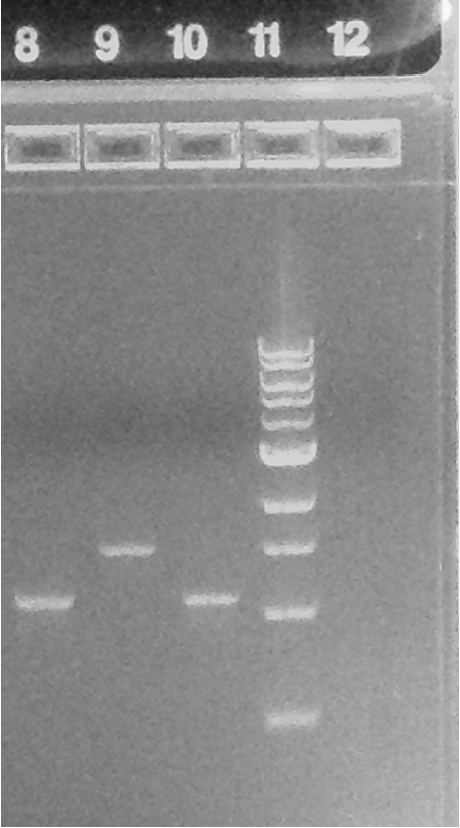Lab 7: Fruit Fly Genetics, Complementation 2, PCR Analysis (Electrophoresis)
1/7
There's no tags or description
Looks like no tags are added yet.
Name | Mastery | Learn | Test | Matching | Spaced |
|---|
No study sessions yet.
8 Terms
How many genetically unique gametes can be produced by an animal where a somatic cell is 2N = 10. Ignore crossing over and assume the maternal and paternal homologs have allelic differences. Use only whole numbers, no decimal place. For example 5 versus 5.0.
32
You do agarose gel electrophoresis for your PCR reaction and see no bands for your 16S rRNA reaction. There were other bands in the same gel for other students’ PCRs, including the positive control. What could explain this result? Note the primers chosen are fairly universal which means they should anneal to marine bacterial species that are bioluminescent (both the rpoB and the 16S rRNA primers).
The colony you picked from actually contained a number of different Aliivibrio species
Your GSI didn’t add Taq polymerase to your PCR tube
You accidentally added the rpoB forward and reverse primers instead of the 16S rRNA primers
SYBR Safe dye was not added to the gel
Your GSI didn’t add Taq polymerase to your PCR tube
Use the following image to answer the two drop down questions. Note that 5 microliters of PCR product was loaded into each of lanes 2-5 as labeled. Lanes 1 and 6 contain the ladder DNA – a total mass of about 800 ng distributed amongst the various sizes as labeled (a clearer image of the ladder is on page 7C). All lanes are labeled at the top.
What is the size of the DNA found in the band in lane 3 in base pairs (bp) about ______
What is the concentration of DNA in the PCR in lane 3 reaction knowing that 5 microliters was loaded _______.
about 1,000 bp
about 20 ng per microliter
Below is an image of the same gel we review in lab lecture. You have loaded 20uL of PCR product in lanes 8-10 on the gel below:

For sequencing reaction, we need 20ng of DNA. How many microliters of the PCR product in lane 9 should we add to the sequencing reaction? Do NOT include units in your answer.
6.94 (between 6.6 and 8)
Based on the picture below, the sex of fly B is [female/male] and the genotype of fly D is _____
female
w+/w OR w+/w+
5 microL of a PCR cleanup was run in lanes 1, 3, and 4. You estimate the band in lane 4 to contain 50 ng of double-stranded DNA.
How many microL of PCR reaction in lane 4 would you need to set up a sequencing reaction that contains 30 ng of double-stranded DNA?
Write your answer as integer (whole number) without any decimal place or unit.
3
A female fly was analyzed in a test cross with a male that showed recessive mutant alleles garnet eyes and cut wings. The F1 progeny of this cross is shown in the table. In subsequent crosses you observe differences in the phenotype distribution between males and females (not shown).
What is the genotype of the female that was used in the test cross?
Male | Female | |
Garnet eyes and normal wings | 38 | 38 |
Normal eyes and normal wings | 12 | 12 |
Garnet eyes and cut wings | 12 | 12 |
Normal eyes and cut wings | 38 | 38 |
E
In the following gel, the size of the double stranded molecules visualized in lane 3 is ____bp
Which of the bands in lanes 2-4 contains the most double stranded molecules? Lane ___
2,000 bp
Lane 2
*bp = size of molecule
ng = mass of molecule.
The largest mass does not automatically translate into the highest number of molecules. You also have to consider the size of the molecule in each band.